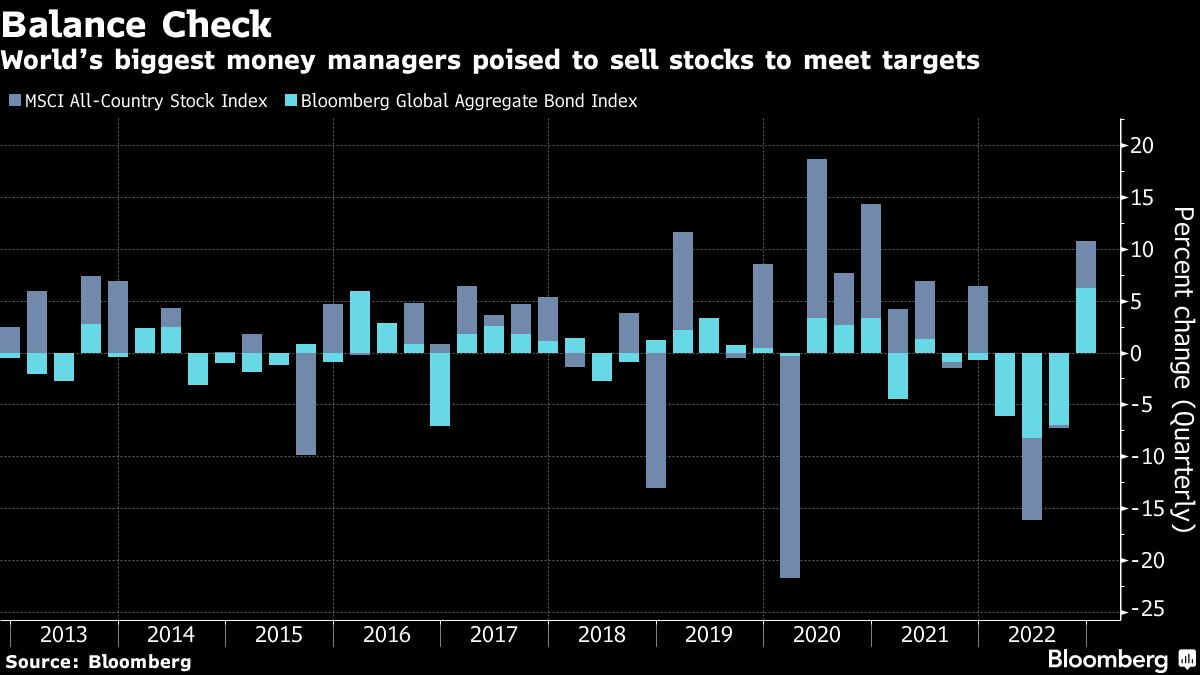
(Bloomberg) — The world’s biggest money managers are set to unload up to $100 billion of stocks in the final few weeks of the year, adding to a selloff that’s snowballed since Jerome Powell’s unequivocal message that policymakers will press on with aggressive tightening at the risk of job cuts and a recession.
Notwithstanding their losses this week, equities gained over the quarter, driving up their value relative to other asset classes and forcing managers with strict allocation mandates to sell them to meet targets. Bonds are the likely beneficiaries of sales by sovereign wealth, pension and balanced mutual funds looking to replenish their fixed-income holdings, according to JPMorgan Chase & Co. and StoneX Financial Inc.
When December wraps up, sovereign wealth funds could be done selling roughly $29 billion in equities while US defined benefit pension plans would need to shift up to $70 billion from equities to bonds to meet their long-term targets and bring them back to September levels, JPMorgan estimates.
The pension and sovereign wealth funds that form the backbone of the investing community typically rebalance their market exposures every quarter to achieve a mix of 60% stocks and 40% bonds.
“The recent equity market correction and bond rally is consistent with the rebalancing hypothesis,” said Vincent Deluard, a macro strategist at StoneX, who projects that some of the rebalancing has already happened this week. “Investors had to sell stocks and buy bonds to get back to target. It makes sense for this to continue until the end of the year.”
The adjustments away from equities will compound some $30 billion of forced sales expected by trend-chasing quants following a slide that’s taken the S&P 500 down about 6% from its November high.
The latest blow came Wednesday when Chair Powell warned interest rates would remain elevated to tame inflation at the end of the Federal Reserve’s final 2022 meeting, dashing hopes the central bank was preparing to ratchet down its aggressive tightening campaign. Instead policymakers indicated they will keep hiking to a peak beyond what the market had anticipated.
According to JPMorgan calculations, Japan’s $1.6 trillion GPIF, the world’s largest pension fund, would have to sell $17 billion of equities to get back to its target asset allocation. The $1.3 trillion Norwegian Oil Fund could move $12 billion from stocks to bonds.
A spokesperson for Norges Bank Investment Management, which manages the Norwegian Oil Fund, declined to comment. A spokesperson for GPIF didn’t immediately respond to an email outside of business hours seeking comment.
The forecasted sales mark a reversal from the first and second quarter trend where big funds were forced to buy stocks and fanned strong, but short-lived rallies. The last time such funds had to unload stocks to rebalance was in the fourth quarter of 2021, according to JPMorgan strategist Nikolaos Panigirtzoglou.
Even so, this month’s sales are likely to pale in comparison to last December’s.
“The estimated rebalancing flow was almost double of the one estimated for the current quarter,” Panigirtzoglou said.
–With assistance from Sid Verma.
©2022 Bloomberg L.P.